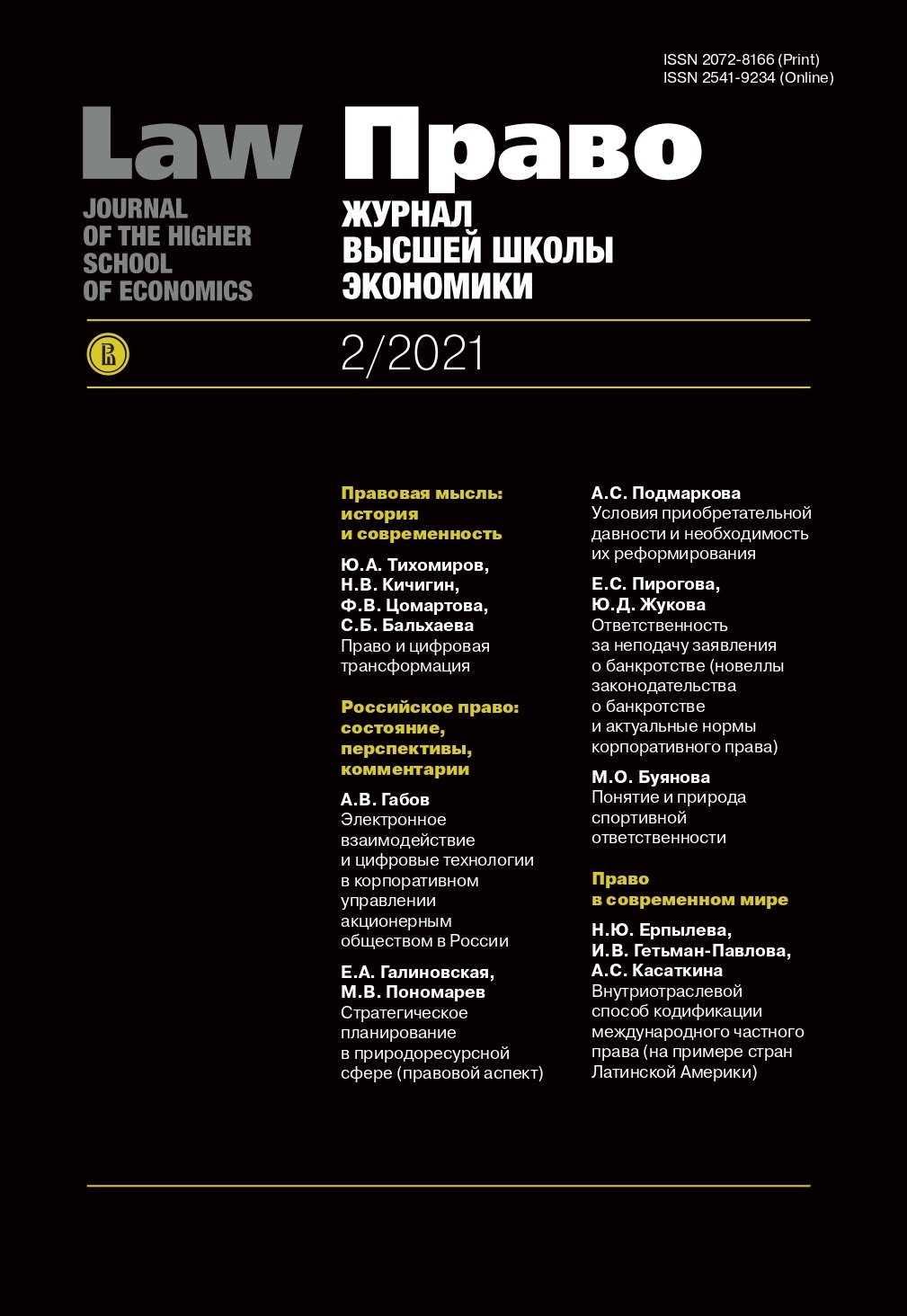Установление судебной юрисдикции по спорам в киберпространстве на примере США
Аннотация
В условиях развития современных цифровых средств коммуникации встает вопрос, насколько адаптивным будет механизм установления судебной юрисдикции по разрешению трансграничных частноправовых споров на основании гибких юрисдикционных привязок по отношению к критериям, основанным исключительно на жесткой территориальной локализации элементов правоотношения. В статье выявляются как позитивные аспекты гибких критериев установления юрисдикции, выраженные в том, что нарушение закона того или иного государства не всегда связано с присутствием на его территории физического или юридического лица, так и негативные аспекты в виде увеличения вероятности юрисдикционного конфликта, который особенно отчетливо проявляется при осуществлении деятельности в информационно-коммуникационном пространстве на платформе киберпространства. Проблемы конфликта юрисдикций актуализируют обращение автора к исследованию форм проявления связей частноправового отношения и государства суда, рассматривающего спор. Выясняется, насколько проявление связей элементов правоотношения и государства суда в эпоху развития киберпространства отличаются от представлений о связи, имевших место до его формирования. Проводится анализ разработанных в США ограничительных механизмов применительно к отношениям в киберпространстве (тест Колдера, тест Зиппо). Формулируется вывод о необходимости использования правоприменительными органами многоаспектного дифференцированного анализа, включающего исследование всей совокупности субъективных, объективных и правовых факторов. К субъективным факторам относят анализ заинтересованности истцов в рассмотрении спора в суде истца; оценку бремени, лежащем на ответчике при рассмотрении дела в суде другого государства; целенаправленную деятельность ответчика на страну суда; предвидение ответчиком возможности рассмотрения спора в государстве суда. К числу объективных факторов относят характер и количество связей элементов спорного правоотношения с государством суда. Правовые факторы проявляются в публично-правовых интересах государства суда в рассмотрении спора. Применительно к спорам в киберпространстве автором предложена ориентировочная комбинация соотношения объективных, субъективных факторов при установлении тесной связи. При написании статьи применены частно-научные методы: формально-юридический, сравнительно-правовой, социологический, а также методы формальной логики (анализ, синтез, абстрагирование, конкретизация, дедукция, индукция, аналогия).
Литература
Bermann P.S. (2002) The globalization of jurisdiction. University of Pennsylvania Law Review, vol. 151, no 2, pp. 311-529.
Bettinger T., Thum D. (2000) Territorial Trademark Rights in the Global Village — International Jurisdiction, Choice of Law and Substantive Law for Trademark Disputes on the Internet (Part One). International Review of Intellectual Property and Competition Law, vol. 31, pp. 162-182.
Brand R.A. (1998) Tort Jurisdiction in a Multilateral Convention: The Lessons of the Due Process Clause and the Brussels Convention. Brooklyn Journal of International Law, vol. 24, no 1, pp. 125-155.
Broy U., Sh. (2018) [Blockchain and cybercurrencies: is the new legislative background needed]. Pravo i tsifrovaya ekonomika, no 1, pp. 13-20. (in Russian)
Collier J. G. (2012) Conflict of Laws. Cambridge University Press, 403 p.
Geist M. (2001) Is There a There? Toward Greater Certainty for Internet Jurisdiction. BTLJ, vol. 16, no 3, pp. 902-938.
Jiménez W.G. (2015) Rules for Offline and Online in Determining Internet Jurisdiction. Global Overview and Colombian cases, vol. 26, pp. 13-62.
Kebede A. Kassim S. (2009) Conflict of Laws. Addis Ababa: Ethiopia, 414 p.
Ludington S.H. (2012) Aiming at the Wrong Target: The “Audience Targeting” Test for Personal Jurisdiction in Internet Defamation Cases. Ohio State Law Journal, vol. 73, pp. 540-574.
Mazhorina M.V. (2020) [Cyberspace and methodology of private international law]. Pravo. Zhurnal Vysshey shkoly ekonomiki, no 2, pp. 230-253. (in Russian)
Michaels R. (2006) Two Paradigms of Jurisdiction. Michigan Journal of International Law, vol. 27, no 4, pp. 1003-1069.
Posada O.C.V. (2005) Jurisdictional problems in Cyberspace Defamation. International Law: Revista colombianade derecho internacional, vol. 6, pp. 247-300.
Shebanova N.A. (2002) [Conflict of jurisdictions: causes and consequences]. Vestnik VAS, no 8, pp. 133-140. (in Russian)
Schugurova I. (2017) [Breach of exclusive rights on the Internet: Conflict of laws regulation]. Avtorskoe pravo i smezhnie prava, no 10, pp. 45-52. (in Russian)
Spencer A. B. (2006) Jurisdiction and the Internet: Returning to Traditional Principles to Analyze Network-Mediated Contacts. University of Illinois Law Review, vol. 71, no 102, pp. 71-126.
Tang Z.S. (2014) Consumer contracts and the Internet in EU private international law / Savin A., Trzaskowski J. (ed.) Research Handbook on EU Internet Law. Cheltenham: Edward Elgar, pp. 254-284.
Copyright (c) 2021 Право. Журнал Высшей школы экономики

Это произведение доступно по лицензии Creative Commons «Attribution-ShareAlike» («Атрибуция — На тех же условиях») 4.0 Всемирная.


















